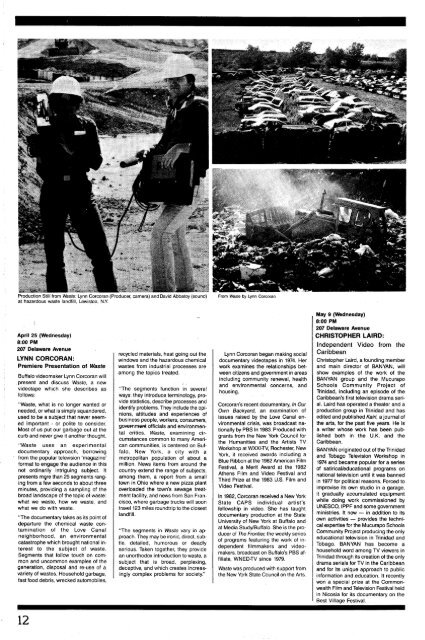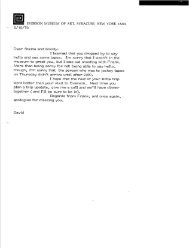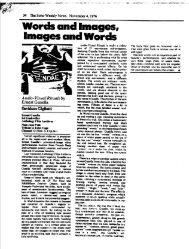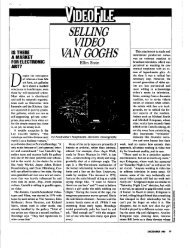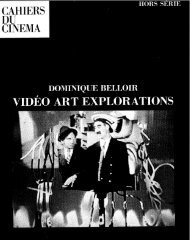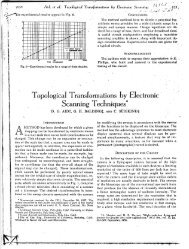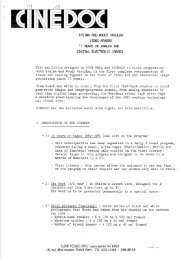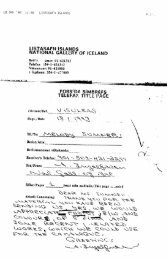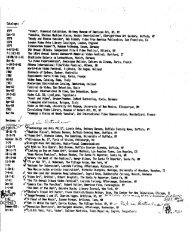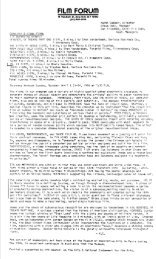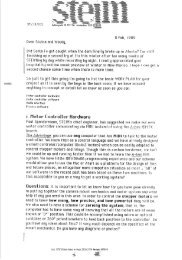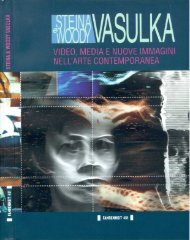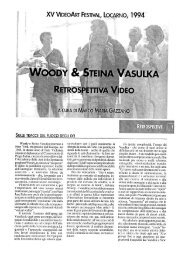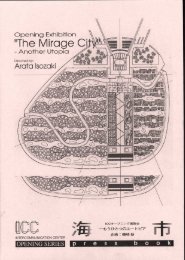MEDIA STUDY/BUFFALO - the Vasulkas
MEDIA STUDY/BUFFALO - the Vasulkas
MEDIA STUDY/BUFFALO - the Vasulkas
You also want an ePaper? Increase the reach of your titles
YUMPU automatically turns print PDFs into web optimized ePapers that Google loves.
Production Still from Waste : Lynn Corcoran(Producer, camera) and David Abbatoy (sound) From Waste by Lynn Corcoran<br />
at hazardous waste landfill, Lewiston, N .Y.<br />
April 25 (Wednesday)<br />
8 :00 PM<br />
207 Delaware Avenue<br />
LYNN CORCORAN :<br />
Premiere Presentation of Waste<br />
Buffalo videomaker Lynn Corcoran will<br />
present and discuss Waste; a new<br />
videotape which she describes as<br />
follows :<br />
"Waste, what is no longer wanted or<br />
needed, or what is simply squandered,<br />
used to be a subject that never seemed<br />
important - or polite to consider.<br />
Most of us put our garbage out at <strong>the</strong><br />
curb and never give it ano<strong>the</strong>r thought .<br />
"Waste uses an experimental<br />
documentary approach, borrowing<br />
from <strong>the</strong> popular television 'magazine'<br />
format to engage <strong>the</strong> audience in this<br />
not ordinarily intriguing subject . It<br />
presents mare than 25 segments ranging<br />
from a few seconds to about three<br />
minutes, providing a sampling of <strong>the</strong><br />
broad landscape of <strong>the</strong> topic of waste :<br />
what we waste, how we waste, and<br />
what we do with waste.<br />
"The documentary takes as its point of<br />
departure <strong>the</strong> chemical waste contamination<br />
of <strong>the</strong> Love Canal<br />
neighborhood, an environmental<br />
catastrophe which brought national interest<br />
to <strong>the</strong> subject of waste .<br />
Segments that follow touch on common<br />
and uncommon examples of <strong>the</strong><br />
generation, disposal and re-use of a<br />
variety of wastes . Household garbage,<br />
fast food debris, wrecked automobiles,<br />
12<br />
recycled materials, heat going out <strong>the</strong><br />
windows and <strong>the</strong> hazardous chemical<br />
wastes from industrial processes are<br />
among <strong>the</strong> topics treated .<br />
"The segments function in several<br />
ways : <strong>the</strong>y introduce terminology, provide<br />
statistics, describe processes and<br />
identify problems . They include <strong>the</strong> opinions,<br />
attitudes and experiences of<br />
business people, workers, consumers,<br />
govemm®rat officials and environmental<br />
critics . Waste, examining circumstances<br />
common to many American<br />
communities, is centered on Buffalo,<br />
New York, a city with a<br />
metropolitan population of about a<br />
million . News items from around <strong>the</strong><br />
country extend <strong>the</strong> range of subjects,<br />
among <strong>the</strong>m, a report from a small<br />
town in Ohio where a new pizza plant<br />
overloaded <strong>the</strong> town's sewage treatment<br />
facility, and news from San Francisco,<br />
where garbage trucks will soon<br />
travel 123 miles roundtrip to <strong>the</strong> closest<br />
landfill .<br />
"The segments in Waste vary in approach<br />
. They may be ironic, direct, subtle,<br />
detailed, humorous or deadly<br />
serious . Taken toge<strong>the</strong>r, <strong>the</strong>y provide<br />
an unorthodox introduction to waste, a<br />
subject that is broad, perplexing,<br />
deceptive, and which creates increasingly<br />
complex problems for society."<br />
Lynn Corcoran began making social<br />
documentary videotapes in 1974 . Her<br />
work examines <strong>the</strong> relationships between<br />
citizens and government in areas<br />
including community renewal, health<br />
and environmental concerns, and<br />
housing .<br />
Corcoran's recent documentary, In.Our<br />
Own Backyard, an examination of<br />
issues raised by <strong>the</strong> Love Canal environmental<br />
crisis, was broadcast nationally<br />
by PBS In 1983. Produced with<br />
grants from <strong>the</strong> New York Council for<br />
<strong>the</strong> Humanities and <strong>the</strong> Artists TV<br />
Workshop at WXXITV, Rochester, New<br />
York, it received awards including a<br />
Blue Ribbon at <strong>the</strong> 1982 American Film<br />
Festival, a Merit Award at <strong>the</strong> 1982<br />
A<strong>the</strong>ns Film and Video Festival and<br />
Third Prize at <strong>the</strong> 1983 U.S . Film and<br />
Video Festival .<br />
In 1982, Corcoran received a New York<br />
State CAPS individual artist's<br />
fellowship in video . She has taught<br />
documentary production at <strong>the</strong> State<br />
University of New York at Buffalo and<br />
at Media Study/Buffalo . She is <strong>the</strong> producer<br />
of The Frontier, <strong>the</strong> weekly series<br />
of programs featuring <strong>the</strong> work of independent<br />
filmmakers and videomakers,<br />
broadcast on Buffalo's PBS affiliate,<br />
WNEDTV since 1979 .<br />
Waste was produced with support from<br />
<strong>the</strong> New York State Council on <strong>the</strong> Arts .<br />
May 9 (Wednesday)<br />
8 :00 PM<br />
207 Delaware Avenue<br />
CHRISTOPHER LAIRD:<br />
Independent Video from <strong>the</strong><br />
Caribbean<br />
Christopher Laird, a founding member<br />
and main director of BANYAN, will<br />
show examples of <strong>the</strong> work of <strong>the</strong><br />
BANYAN group and <strong>the</strong> Mucurapo<br />
Schools Community Project of<br />
Trinidad, including an episode of <strong>the</strong><br />
Caribbean's first television drama serial<br />
. Laird has operated a <strong>the</strong>ater and a<br />
production group in Trinidad and has<br />
edited and published Kaid, a journal of<br />
<strong>the</strong> arts, for <strong>the</strong> past five years . He is<br />
a writer whose work has been published<br />
:both in <strong>the</strong> U.K . and <strong>the</strong><br />
Caribbean .<br />
BANYAN originated out of <strong>the</strong> Trinidad<br />
and Tobago Television Workshop in<br />
1974 and became popular for a series<br />
of satirical/educational programs on<br />
national television until it was banned<br />
in 1977 for political reasons . Forced to<br />
improvise its own studio in a garage,<br />
it gradually accumulated equipment<br />
while doing work commissioned by<br />
UNESCO, IPPF and some government<br />
ministries. It now - in addition to its<br />
own activities - provides <strong>the</strong> technical<br />
expertise for <strong>the</strong> Mucurapo Schools<br />
Community Project producing <strong>the</strong> only<br />
educational television in Trinidad and<br />
Tobago. BANYAN has become a<br />
household word among TV viewers in<br />
Trinidad through its creation of <strong>the</strong> only<br />
drama serials for TV in <strong>the</strong> Caribbean<br />
and for its unique approach to public<br />
information and education . It recently<br />
won a special prize at <strong>the</strong> Commonwealth<br />
Film and Television Festival held<br />
in Nicosia for its documentary on <strong>the</strong><br />
Best Village Festival .


